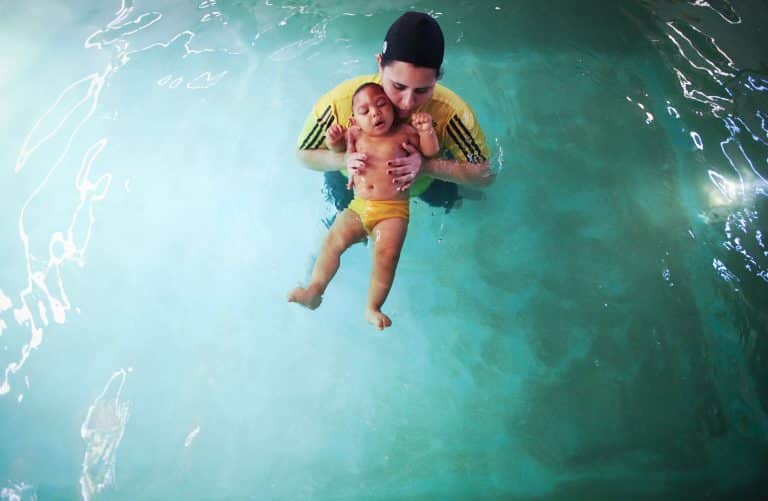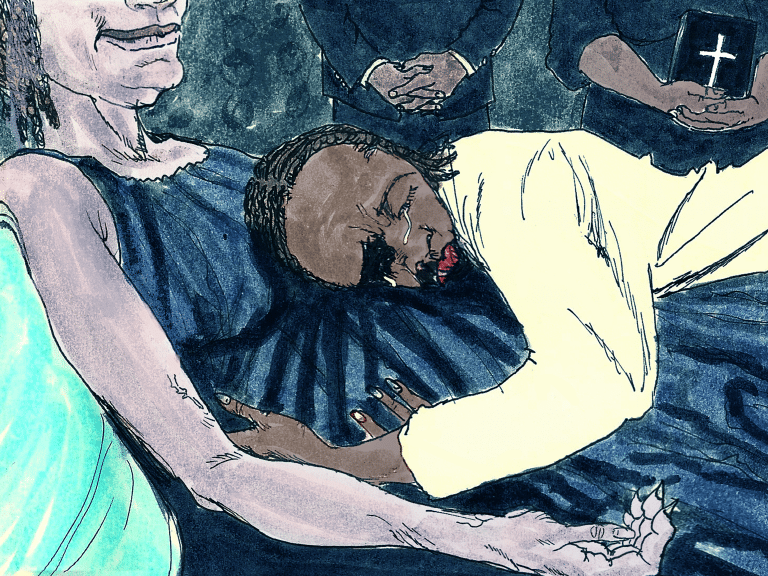
Image by Mario Tama/Getty Images, © All Rights Reserved.
The Courage To Acknowledge Our Frailty
Most, if not all, of us will be disabled in some way, at some point, in our lives. Many of us are disabled during the duration of our entire lives.
If we’re lucky enough to live a long time, we all get old and our bodies fall apart.
We all die. Sometimes children even die.
Click away yet?
If you’re still here, stick with me. I’ve been thinking about the collection of human truths that our society most strongly resists acknowledging — things like disability, disease, aging, death. What does it say about who we are and what we are afraid of? What does it say about what unexplored opportunities there might be for truth-telling and liberating wisdom?
Take the last truth, the one probably most abhorrent for any of us to face head on. I’ve slammed into it on a couple of occasions, most recently when I was pregnant with my first kid and met another pregnant mom at a barbeque. “Your first?” I asked.
“No,” she said, matter-of-factly.
“How old is your first?” I followed up.
“He died, actually,” she calmly said, then went on to explain that her son had died 21 days after he was born of a rare disease, called polymicrogyria, which literally means too many small folds in the brain.
I don’t remember her exact words in that moment. I mostly remember the sense that the ground under me shifted, almost like I was experiencing a mental earthquake of sorts (fitting as we’d just moved to the Bay Area). On the drive home with John, my partner, I told him what I’d learned and we both talked about how inconceivable that kind of loss was and how much we admired her strength and grace as she told us their story.
I would come to know this family quite well. They now have two healthy children, one of whom, Finley, is close friends with my oldest, Maya. They fight and make up like sisters — one minute wrestling tenaciously over a seat they both want to sit in, the next sneaking plastic jewels and illegible love notes into one another’s cubbies at preschool.
Finley knows about her brother, Lars. There are pictures of him in the house. She has spent time at the George Mark House where he died — one of only two free-standing children’s hospices in America. (There are, by way of comparison, 54 in the U.K. alone.) Most children in this country die in hospitals surrounded by fluorescent lights and beeping machines, their parents exhausted from sleeping in chairs next to the bed and fighting with insurance companies.
At George Mark, it’s another story. The entire house is filled with things that delight children — toys and gardens and animals. On more than one occasion, they’ve brought camels on site, because — as founder Kathy Hull explains it — they’re not focused on the limitations these kids face. These kids are dying. Once that is acknowledged, there is a freedom in being able to answer every inquiry with “Why not?” Through the generosity of donors, no one is turned away for lack of funds.
When I visited George Mark and saw the warm therapy pool, where Lars seemed most at ease in his final days, and a sensory room with its plush textiles and psychedelic lighting, and heard about the lemonade stands and the annual prom, I was so struck by the joy that permeated the place. There is profound and relentless loss there, of course. The place is defined by loss. And yet there was a kind of palpable liberation in facing up to that.
I see this same freedom in the emotional courage of my friends who lost their son, too. They are unusually in-touch with what is sacred in the midst of the chaos of this moment, juggling two small kids and two big jobs. We rarely hear them complaining about sleeplessness, as empathic as they are when we do. They’re always up for hosting last-minute dinners at their house — the kids eating more ice cream than vegetables, and sometimes acting like wild things, and, oh well, who wants a glass of wine, and isn’t it all so amazing?
And it is. Which is something that is often hard to hang on to when the default assumption is that our very safety and/or health is guaranteed. It’s not. I’ve learned that again (one must learn this over and over again) from being in relationship with them and other friends who experience disability daily. I’ve also been reminded of it while devouring the new podcast Terrible, Thanks for Asking.
If we have the courage to acknowledge our own frailty, and the frailty of those around us, then we would treat healthcare as a human right, not a partisan football. We would resource our institutions differently — creating the space for all children who are going to die to live in settings like George Mark. We would design public transportation and workplaces and schools with the disabled in mind, and as blind architect Chris Downey points out, they would therefore be better designed for everybody.
And perhaps most importantly, if we had the courage to acknowledge our own frailty, we would relate to our lives and those we love differently. One of the great spiritual challenges of my life is managing my own fear of losing those I love. I sense the ways in which there is a chance to feel the fullness of the miracle of my daughters only by way of acknowledging that their very existence is not promised. It’s the darkest truth I can imagine looking straight in the eye, but it simultaneously helps me see them in technicolor.
Likewise, if I think of my health and physical ability as a momentary pleasure, I feel less angry when I’m sick and less bitter about losing control. I see my body for what it is — a complex system that works a surprising amount of the time. I want to take tender care of it rather than perfect or resent it. That makes me more tender towards everyone else. That makes me marvel at how often we all get by, thanks to one another — even as we have such a long way to go in more publicly addressing disability and death.
Paulo Coelho writes, “The strongest love is the love that can demonstrate its fragility.” I would argue that what’s true on the micro level is often true on the macro level; the strongest society is the one that can acknowledge its frailty and mortality, too.


Share your reflection